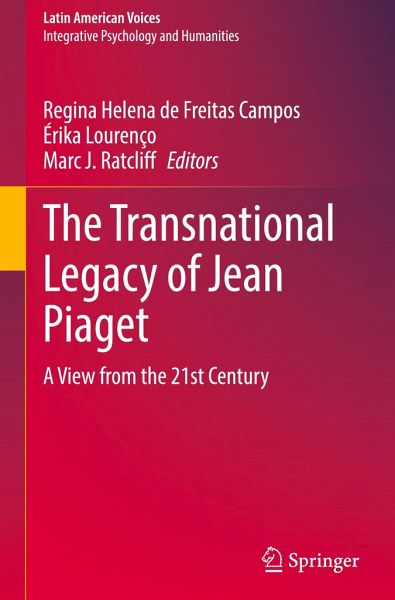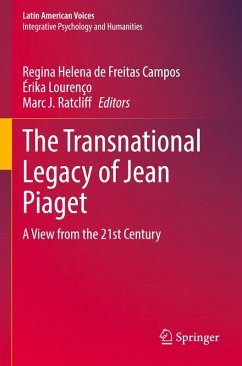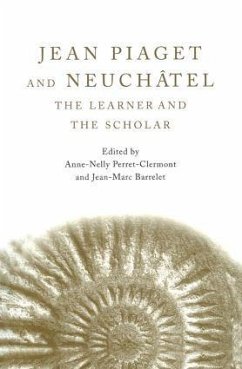
The Transnational Legacy of Jean Piaget
A View from the 21st Century
Herausgegeben: Campos, Regina Helena de Freitas; Lourenço, Érika; Ratcliff, Marc J.

PAYBACK Punkte
57 °P sammeln!
This book presents a collection of studies on the circulation of Jean Piaget's ideas and works between Europe and Latin America, and how this transnational legacy influenced different fields of research and practice, such as psychology, education and philosophy. The volume brings together contributions presented at the International Colloquium Jean Piaget in Brazil and Latin America, held during the 38th Annual Helena Antipoff Meeting, organized by the Federal University of Minas Gerais, Brazil, in collaboration with the University of Geneva, Switzerland.The book is organized in three parts. C...
This book presents a collection of studies on the circulation of Jean Piaget's ideas and works between Europe and Latin America, and how this transnational legacy influenced different fields of research and practice, such as psychology, education and philosophy. The volume brings together contributions presented at the International Colloquium Jean Piaget in Brazil and Latin America, held during the 38th Annual Helena Antipoff Meeting, organized by the Federal University of Minas Gerais, Brazil, in collaboration with the University of Geneva, Switzerland.
The book is organized in three parts. Chapters in the first part analyze Piaget's role as a builder of an international network in psychology, education and peace promotion in the 20th century, with a special focus on the circulation of his ideas and works between Switzerland and France. The second part focuses on historical and contemporary dialogues, conflicts and controversies between Piaget and other authors, such as Henri Wallon, Carl Rogers, Jürgen Habermas, and, especially, Helena Antipoff, the Russian-Brazilian psychologist and educator who was one of the first researchers to introduce Piaget in Brazil and to establish a bridge between Latin America and the Geneva school of psychological and educational sciences. Finally, chapters in the third part of the book explore different aspects of the reception and appropriation of Piaget's works and ideas in the Brazilian context.
The Transnational Legacy of Jean Piaget: A View from the 21st Century will be of interest to researchers in different fields within the human and social sciences, such as developmental, educational and school psychologists; educators; philosophers and historians of psychology and education interested in understanding how Piaget's progressist ideas have contributed to the development of psychological and educational sciences in Europe and Latin America.
Some chapters ofthis book were originally written in Portuguese and French and translated into English with the help of artificial intelligence. A subsequent human revision was done primarily in terms of content.
The book is organized in three parts. Chapters in the first part analyze Piaget's role as a builder of an international network in psychology, education and peace promotion in the 20th century, with a special focus on the circulation of his ideas and works between Switzerland and France. The second part focuses on historical and contemporary dialogues, conflicts and controversies between Piaget and other authors, such as Henri Wallon, Carl Rogers, Jürgen Habermas, and, especially, Helena Antipoff, the Russian-Brazilian psychologist and educator who was one of the first researchers to introduce Piaget in Brazil and to establish a bridge between Latin America and the Geneva school of psychological and educational sciences. Finally, chapters in the third part of the book explore different aspects of the reception and appropriation of Piaget's works and ideas in the Brazilian context.
The Transnational Legacy of Jean Piaget: A View from the 21st Century will be of interest to researchers in different fields within the human and social sciences, such as developmental, educational and school psychologists; educators; philosophers and historians of psychology and education interested in understanding how Piaget's progressist ideas have contributed to the development of psychological and educational sciences in Europe and Latin America.
Some chapters ofthis book were originally written in Portuguese and French and translated into English with the help of artificial intelligence. A subsequent human revision was done primarily in terms of content.














